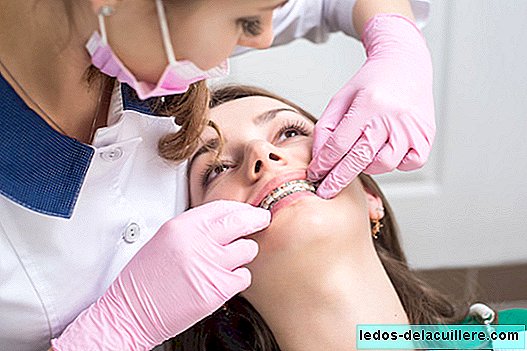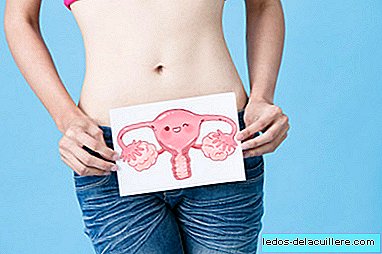Pregnancy involves a series of changes for women that can affect the oral cavity, increasing the chances of suffering from cavities and periodontal diseases. That is why dentists recommend performing a complete mouth check at the time pregnancy is known, in order to assess possible treatments.
Likewise, if the woman is performing a orthodontic treatment At the time you become pregnant, it is important that you notify the specialist as soon as possible, in order to maximize oral care.
I am undergoing orthodontic treatment and I have become pregnant, what do I do?
Every day it is more frequent for young adult women to have a orthodontic treatment to improve your smile and the health of your mouth. In some cases, the treatment already started may coincide with the moment in which the woman becomes pregnant, and it is likely that then doubts arise about how to proceed in this regard.
Is there any risk of continuing orthodontic treatment during pregnancy? Or is it better to postpone until giving birth? We have spoken with the president of the Spanish Society of Orthodontics (SEDO), Dr. Juan Carlos Pérez Varela, and these have been his recommendations:
"There is no major problem that contraindicates orthodontic treatment during pregnancy, but it is necessary that the orthodontist be informed that a baby is waiting so you don't have any dental x-ray from the moment you know it, or even from the moment the woman starts trying to get pregnant. "
"And it is important that the specialist treat women of childbearing age who are looking for a child as if they were already pregnant, because they could be pregnant and not even know it."
Dr. Pérez Varela insists on the importance of extreme measures of bucondental hygiene during pregnancy, but especially if the woman has a treatment with brackets.

During pregnancy hormonal changes cause greater gingivitis (inflammation of the gums) that can be aggravated by irritating factors. The element that usually creates the most gingivitis is dental plaque and orthodontic appliances increase the chances of retaining plaque if a correct oral cleaning is not performed.
If you are using braces, your orthodontist will inform you about the best way to proceed to daily tooth brushing.
I am pregnant and I want to have an orthodontic treatment: better wait.
But it may happen that the woman is thinking about getting an orthodontic treatment and before starting it she gets pregnant. In that case, the SEDO recommends waiting to give birth to begin with such treatment, since some of the tests that need to be performed to carry it out are not advisable during pregnancy.
"If you are pregnant and you are thinking about starting an orthodontic treatment it is more advisable to wait for the baby to be born to do the previous study necessary for a correct diagnosis and treatment planning" - explains Dr. Pérez Varela.
"Some of the tests, such as mouth molds, photographs of the face and teeth, or records of the patient's bite do not imply any risk to the pregnant woman or the baby."
"But for some treatments, for example in cases of orthognathic surgeries, it may be essential to perform complementary tests, such as X-rays, which are not as advisable during pregnancy".

However, Dr. Pérez Varela insists that there is no need to be alarmed if there is no choice but to perform dental x-rays while pregnant:
"If you have to do a radiographic exam to follow up on a dental treatment that started before pregnancy, you should not be alarmed because the beam of radiographic rays is not directed towards the abdomen and the amount of radiation that is produced is small, so dental x-rays can be done putting on a lead apron that covers the belly and protects the baby "
Other type of dental treatments
During the first trimester of pregnancy the experts they advise not to have any dental treatment unless it is very necessary and cannot wait to be performed during the second quarter, which is the most favorable for it.

These urgent cases would be, for example, extractions that cannot be expected, large oral infections or caries likely to cause periapical infection.
"On many occasions they ask us if pregnant women can have dental treatments and we always answer that the pregnant woman can receive the dental treatment she needs, but during the first trimester, only emergency treatments are usually performed, since it is during the first quarter when the main structures, such as the central nervous system with the brain, the heart and the vascular system, are going to be formed "- explains Juan Carlos Pérez Varela
The second quarter, on the other hand, It is the most suitable to undergo any dental treatment although you always have to report the pregnancy to the dentist to take appropriate precautions
"The second trimester is the ideal time to perform any dental treatment, since there is no problem in using local anesthesia. Here we return to see the importance of reporting pregnancy, since the specialist will use anesthetic drugs that do not affect the baby" - comments Dr. Pérez Varela.
And the third quarter, like the first, is again the least recommended for any dental treatment. To the risks of the use of anesthesia, the volume of the gut is added, which can make it difficult or uncomfortable for the mother to remain in the same position for a long time, and even the stress that many people are supposed to go to the dentist.
Therefore, in this quarter only the urgent treatments that cannot wait to be practiced after giving birth, and in no case will nitrous oxide (popularly known as "laughing gas") be used as a sedative.
"In the last trimester of pregnancy it can be annoying to remain seated in the orthodontist's chair for a prolonged period of time, so we recommend waiting for the baby to be born to start long treatments. However, if you are doing a treatment when you find out that you are pregnant do not worry, since the specialist will be careful that the belly does not hinder the venous return of your legs "- concludes Dr. Pérez Varela.
most of These recommendations would also apply after giving birth, if the mother has opted for breastfeeding. Experts remember that everything that happens to the bloodstream can affect the mother's milk in the same way, so that any treatment that involves anesthesia or the use of certain products (such as those used for teeth whitening), It is advisable to postpone them whenever possible.
IStock Photos
Acknowledgments Doctor Juan Carlos Pérez Varela, President of SEDO
In Babies and More Gingivitis during pregnancy: how to keep it at bay, The importance of going to the gynecologist to plan the pregnancy, pregnant? Take care of your mouth: gum infections double the risk of preterm birth, X-rays and pregnancy: what you should know, Back pain during pregnancy, Mother's stress before pregnancy predisposes to low birth weight












